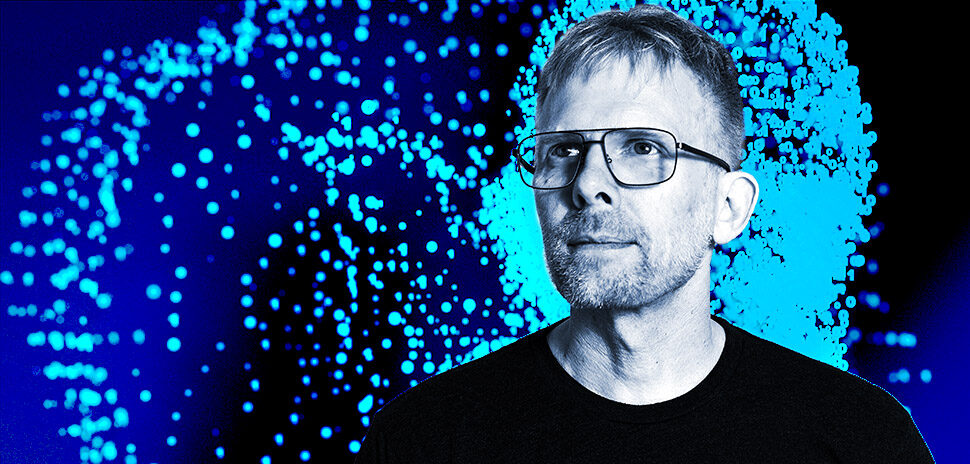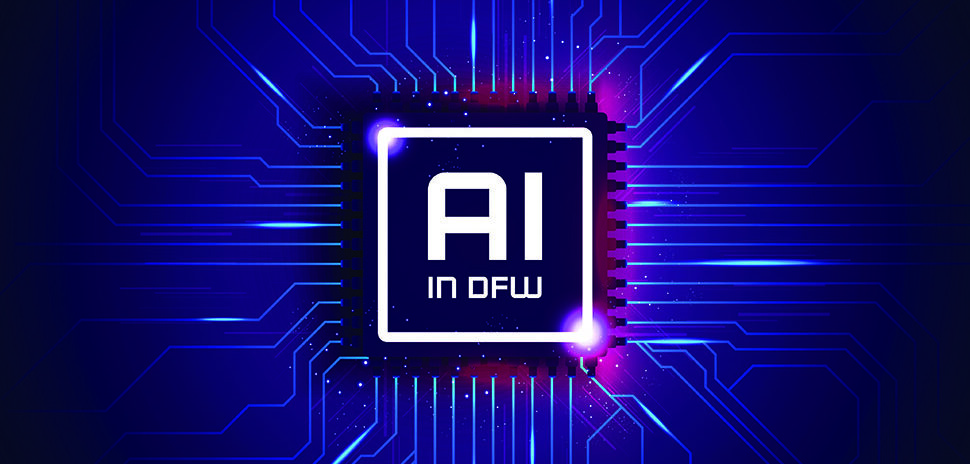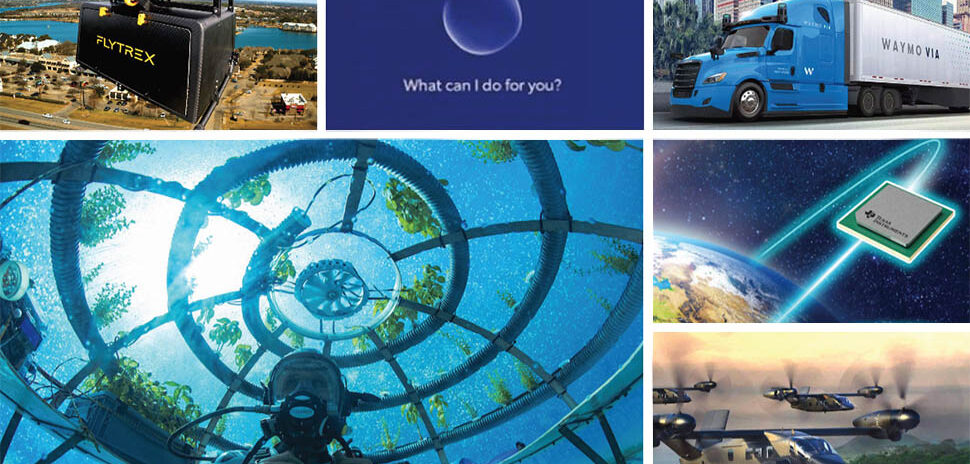Innovations in artificial intelligence are transforming the workplace, and it’s predicted that millions of today’s jobs won’t even exist by 2030. So, how are area universities preparing students for this latest industrial revolution? Here’s a sampling.
Southern Methodist University
Dallas. Private. Founded 1911.
6,908 undergraduate students; 5,477 graduate students (2021).
PREPARING THE AI/ML WORKFORCE OF TOMORROW
SMU made a major commitment to Al primacy with the addition of a NVIDIA DGX SuperPOD to its high-speed computing ecosystem. Acquisition of the sophisticated Al technology—one of only two SuperPODs at work at a U.S. university—increases SMU’s supercomputer memory tenfold and sets the stage for AI and ML 25 times faster than previous levels. SMU provides Ph.D.-level staff to train faculty and students to use AI/ML in research and is infusing supercomputing with AI capabilities into every level of research across the campus.
DEGREES AND SPECIALIZATIONS IN AI/ML—AND BEYOND
Offers an online M.S. degree in Data Science with an AI specialization. Offers M.S. degree in Computer Science with core specialization in both AI and ML (Python). Offerings in AI/ML beyond tech include an undergraduate Data Science major and minor with an ML course requirement targeting students in business and the humanities and social sciences. The SMU Guildhall and Simmons School of Education & Human Development research also incorporate AI/ML elements.
PARTNERSHIPS
SMU’s AT&T Center for Virtualization partners with Al company Pangiam on a new lab aimed at reducing bias in Al systems. Another partnership between the Deason Institute for Cyber Security, Goldman Sachs, and Prairie View A&M focuses on research to detect and defend against cyber threats related to employees working remotely. An AI-focused collaboration between AT&T mentors and SMU’s AT&T Data Science scholars addresses the need for a pipeline of students who are traditionally underrepresented in computer science fields.
![]()
Texas Christian University
Fort Worth. Private. Est. 1873.
10,523 undergraduate students; 1,750 graduate students (2022).
PREPARING THE AI/ML WORKFORCE OF TOMORROW
Dr. Liran Ma, TCU computer science professor, is planning to develop a series of real-world, story-based, hands-on learning activities hosted on a unified lab platform to promote Al/ML skills acquisition across STEM majors at the undergraduate level. Ma and other TCU researchers have submitted a grant proposal to the National Science Foundation, aiming to make a broad impact in preparing tomorrow’s workforce in AI/ML.
DEGREES AND SPECIALIZATIONS IN AI/ML—AND BEYOND
The computer science department offers a B.S. degree in Data Science focusing mostly on AI/ML models and implementations. The department also offers AI/ML directly related courses: Introduction to Data Science; Data Mining and Visualization; Artificial Intelligence; and Deep Learning.
PARTNERSHIPS
TCU faculty partnered with Georgia State University for National Science Foundation funding for immersive student learning environments to ensure that every STEM student has access to efficient training in the most current AI methods. In addition, TCU’s new degree in data science covers concepts such as probability, statistics, regression, databases, data visualization, big data, and ML in partnership with industry for real-world problems, according to the Texas Research Association.
![]()
University of North Texas
Denton. Public. Founded 1890.
32,450 undergraduate students; 9,718 graduate students (2021).
PREPARING THE AI/ML WORKFORCE OF TOMORROW
UNT created Texas’ first standalone M.S. degree in Artificial Intelligence, anchoring a variety of degree programs to leverage data to solve complex problems. From computer science programs to data engineering programs, students are trained to develop models and integrate them into applications and business processes in conjunction with a number of degree programs across all UNT’s colleges.
DEGREES AND SPECIALIZATIONS IN AI/ML—AND BEYOND
Offers the first standalone M.S. degree in Artificial Intelligence in Texas. It also offers a variety of specializations within the degree including autonomous systems, biomedical engineering, and general machine learning. In addition, UNT’s undergraduate AI certificate is specifically designed to engage students outside the College of Engineering, starting with two courses that introduce students across the university to the fundamentals of AI and software development.
PARTNERSHIPS
UNT heavily engages high-school-age students to encourage their development in AI, commonly through the Texas Academy of Math and Science program. UNT’s Al program also partners with sponsors on a regular basis for everything from course project ideas to year-long capstone development teams, summer research teams in the UNT AI/CS Summer Research Program, and supporting M.S. or Ph.D. thesis student projects. Plus, UNT reaches nontraditional students with online educational opportunities for undergraduates in the AI College Pathways program through a partnership with AI4ALL, which opens doors to historically excluded students through educational mentorship.
![]()
The University of Texas at Arlington
Arlington. Public. Founded 1895.
27,704 undergraduate students; 11,624 graduate students (2022).
PREPARING THE AI/ML WORKFORCE OF TOMORROW
UTA’s computer science and engineering department offers many courses in Al/ML, including neural networks, data mining, and computer vision. Other departments and schools, including the colleges of Business, Science, and Nursing and Health Innovation, contribute to the Al/ML learning sector as well. Also, UTA has recently created an M.S. degree program in data science that includes many AI/ML courses, and has been reaching out to marginalized communities with annual events focused on computing research. The events are open to high school students.
DEGREES AND SPECIALIZATIONS IN AI/ML—AND BEYOND
Offers graduate certificates in Artificial Intelligence; Big Data Management and Data Science; Cybersecurity and Privacy; Deep Learning; and Embedded Systems. Offers undergraduate certificates in Cybersecurity. Plus, multiple faculty members in the CSE department are engaged in research programs using AI/ML for social good and societal transformation. Examples include mitigation of misinformation and toxic social media messaging and biopsy image analysis for lung cancer patients.
PARTNERSHIPS
UTA events, such as OurCS@DFW and the Student Computing Research Festival, provide Al/ML learning to high school students. UTA professors visit high schools regularly and are supporting creation of virtual reality trailers showcasing career possibilities in STEM fields. State Farm recently opened the UTA State Farm Technology Lab, and UTA’s Center for Artificial Intelligence and Big Data is collaborating on data- science tutorials with the Texas Manufacturing Assistance Center. In addition, UTA is in the process of discussing collaboration with the Texas Manufacturing Assistance Center, including courses and certificates focused on data science that will help retrain working professionals at manufacturing companies.
![]()
The University of Texas at Dallas
Richardson. Public. Est. 1969.
22,730 undergraduate students; 8,840 graduate students (2022).
PREPARING THE AI/ML WORKFORCE OF TOMORROW
The computer science department has a strong Al/ML program at both undergraduate and graduate levels. A dozen-plus tenure-track faculty do research in Al/ML and publish in top journals in the field. The CSRankings.org site places UTD’s computer science program at No. 11 nationally in AI for 2012-2022. Students are exposed to projects using AI and ML for natural language processing, computer vision, cybersecurity and privacy, and human-computer interaction. Graduate and undergraduate students are employed by top tech companies like Meta, Alphabet, Amazon, Microsoft, and Texas Instruments.
DEGREES AND SPECIALIZATIONS IN AI/ML—AND BEYOND
Offers specializations at the graduate level in Intelligent Systems (AI + ML) and Data Science (which includes ML). Undergraduate students can also specialize through various elective courses. The university also offers courses incorporating ML in a variety of disciplines including cognition and neuroscience, business analytics, human development and communication sciences, operations research, physics, and statistics. The School of Arts, Humanities and Technology’s Anechoic Chamber and Transmedia Studio also explore AI.
PARTNERSHIPS
UTD partners with high schools through its Computer Science Education and Outreach Center, which offers courses including an Artificial Intelligence Hands-On Bootcamp as well as talks and workshops related to Al/ML year-round for K-12 students. It also partners with local companies and governing agencies on AI/ML learning initiatives. The new CS Center for Applied AI & Machine Learning at the Richardson IQ is funded by industry and provides in-house AI/ML training to local industry upon request.
Sources: The schools, unless otherwise noted.
Sandra Engelland contributed to this report.
A version of this story was originally published in Dallas Innovates 2023.
![]()
Read Dallas Innovates 2023 online
Take a journey into the heart of North Texas business. Our annual magazine takes you on a tour of the innovative and creative forces shaping the future.
WHAT ARE YOU INNOVATING? Let us know.
![]()
Get on the list.
Dallas Innovates, every day.
Sign up for our daily digest to keep your eye on what’s new and next in Dallas-Fort Worth.










![[Image: Ryzhi/istockphoto]](https://s24806.pcdn.co/wp-content/uploads/2019/02/Ryzhi_big-data-and-artificial-intelligence-domination-concept-vector-id1060622908.jpg)






















































